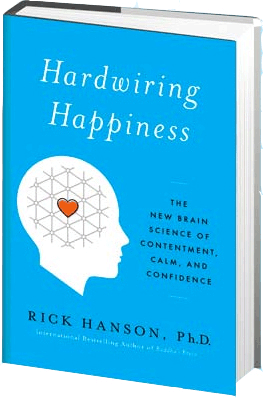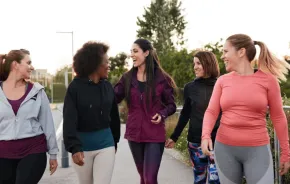 Dr. Rick Hanson, author of Hardwiring Happiness, has good news for parents everywhere: Our brains — both adult and child-size ones — can learn how to be more positive. He will share this much-needed information at an upcoming lecture on March 22 at University of Washington's Kane Hall, titled "Mindfulness Cultivation: Growing Happiness, Compassion, Resilience and Other Inner Strengths."
Dr. Rick Hanson, author of Hardwiring Happiness, has good news for parents everywhere: Our brains — both adult and child-size ones — can learn how to be more positive. He will share this much-needed information at an upcoming lecture on March 22 at University of Washington's Kane Hall, titled "Mindfulness Cultivation: Growing Happiness, Compassion, Resilience and Other Inner Strengths."
We asked the author for a preview of his talk. Reader, I admit that after talking with Dr. Hanson, I went online and reserved a ticket for Tuesday’s talk. I want to hear more about how to cultivate the good stuff in my family. And it’s good to know the Center for Child and Family Well-Being (CCFW) regularly hosts free public lectures on such critical topics.
Q: My own issues such as anger gets in the way of cultivating mindfulness. How do we get past ourselves so we can parent our children well?
Hanson: Our kids are 28 and 25. When I look back at my own parenting, 90 percent of my own mistakes with my kids started with my own anger. Anger is the tip of the spear! The idea of mindfulness is not enough. We want to grow the good in our kids and the good in ourselves for our relationships. Then we can keep our head clear when the oatmeal starts to fly. When we have a bad night and we say I just can’t go there again, what do we do so we don’t go there the next time?
The problem is negative experiences are caught every time thanks to our stone-age brains. Our brains are like Velcro for bad experiences and Teflon for good experiences. The good news is neuro plasticity: our brains can grow the good. If we can see the good facts around us and let ourselves really feel the good for 5 to 10 to 20 seconds in a row, we can truly cultivate the good inside. Then every day when you go to bed, you are a little wiser and a little more peaceful than when you woke up that morning. The trick is learning how to use daily life, which is a trunk full of little opportunities for personal growth and healing.
 Q: How, specifically, do you grow the good when your brain holds on to how angry you were last week and notes how very good you are at getting angry?
Q: How, specifically, do you grow the good when your brain holds on to how angry you were last week and notes how very good you are at getting angry?
Hanson: First, notice perspective: Little things will come and go, but the big thing is your relationship with your kids. Focus on the bridges you build with them. How can you grow an inner shock absorber of feeling good so the little crap doesn’t derail you? The dirty little secret is that kids are annoying and family life is stressful!
Q: Say she’s 11 and your kid won’t talk to you and you know something is wrong.
Hanson: I have two suggestions. Look for good facts and then let yourself feel those. Maybe half a dozen times a day, notice the good and don’t just blow right by those moments. For example, I’m looking out my window and seeing beautiful flowers. Let a moment like that land: Really experience it and then enjoy it for 20 seconds in a row so it feels like it is really sinking in. You’re filling a bucket, drop by drop, a handful of times every day. Then you are shifting your relationship to the day more and more so you are seeing the good more and more and you are receiving the good. Doing this actually heals old wounds and grows psychological resources.
Second, look for little lessons throughout the day. Oh, my partner is really worried and because of that he’s kind of irritable. Then you can be kinder or keep quiet or listen more in response to that clue.
Notice the good stuff every time it happens for 10 to 20 seconds. Then you are rewriting the neurons in your brain and truly cultivating the good within yourself.
Q: What if you want to grow a certain trait? For example, when my youngest was going to reading tutoring, I noticed how patient the tutor was, so I practiced being more like her. Later I realized I learned patience from her.
Hanson: Again, we can boil this down to four simple words: Have it, enjoy it. Or we can say: From state to trait. To develop wholesome traits inside ourselves and our kids, we have to experience these traits. You said, I need to be more patience. You watched and practiced, and while you practiced, you had the experience of being patient. If your child has the experience of watching an older child be patience with an annoying younger child, they are learning to be patient just by watching that older child.
Here’s the thing, though. Many people, children included, don’t learn much from those experiences. Even though I know not to say x to my wife again, I find myself saying x to her again. How do we help those good experiences that our kids are having to really sink in so they become changed in a really good way? We boil it down to really simple practical things. I’d go back to what I said above: Take in the good. Grow really good flowers by noticing the good stuff every time it happens for 10 to 20 seconds. Then you are rewriting the neurons in your brain and truly cultivating the good within yourself.
If you go ...
When: Tuesday, March 22, 7 p.m.
Where: University of Washington's Kane Hall
Tickets: Free, but register at this link.
Books: Dr. Hanson will be signing books after the lecture. You can purchase Hardwiring Happiness; Buddha’s Brain; and Just One Thing from the University Bookstore table before and after the lecture.
CCFW: The Center for Child and Family Well-Being offers free lectures to the public with an aim to promote the positive development and well-being of children of all ages. The CCFW focuses on parenting, mindfulness and compassion to transform the lives of children in Washington, across the country, and around the world. Check their website regularly to learn about upcoming events and free public lectures.











